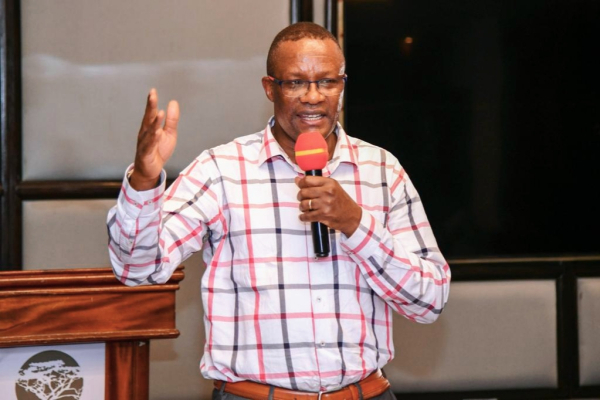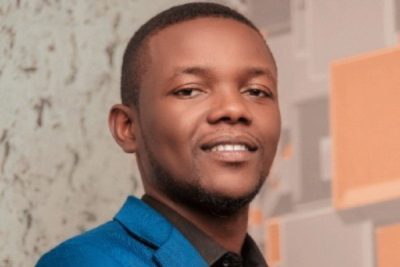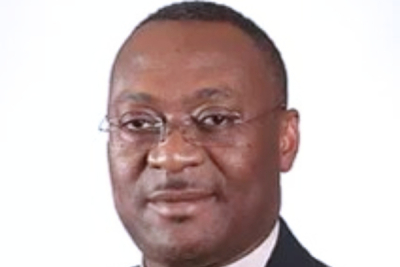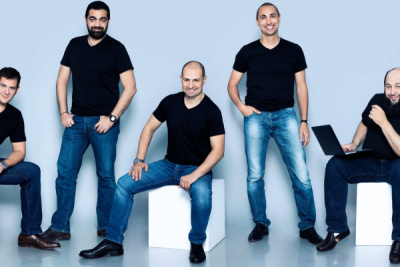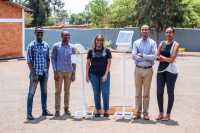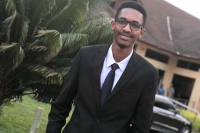Thanks to the assistance, Kenya expects to complete its ongoing digital projects within ten years.
Last Thursday, the Kenyan Minister of Digital Economy Eliud Owalo (photo) indicated the country requested the World Bank's financial assistance for the partial implementation of its 100,000-km fiber deployment project.
“With Cabinet approval already in place, we are now set to roll out an initial 5,000 kilometers by June 2023. We are also in talks with the World Bank, through the National Treasury, to secure part of the funding for the digital superhighway, through the Kenya Digital Economy Acceleration Project (KDEAP),” the government official said speaking at the third edition of the digital summit organized by the Nation Media Group in Mombasa. The fiber optic project is part of the 2022-2023 National Digital Master Plan launched in April 2022.
During the digital summit, Eliud Owalo also announced other equally important digital projects, including the implementation of a national identity system by June, the integration of 5,000 government services on the e-citizen portal, and the digitization of the land registry which could potentially unlock 100 million shillings in revenue (about $790,000) from the land sector.
Samira Njoya
Several African countries have adopted biometric identification in strategic sectors like public administration, security, transport, and finance. This much-appreciated development stems from their will to improve efficiency but, this adoption raises concerns, about various cases of abuse, it could facilitate.
Over the past decade, biometric adoption was accelerated in Africa with governments instituting fingerprint, facial, and iris recognition as the authentication norms in the issuance of various identity documents. and national identity cards. In its 2020-2030 Digital Transformation Strategy for Africa, the African Union even emphasized the use of such biometric identification technologies.
The Pan-African Development Institution believes that digital identity is essential for the digital economy because it promotes trust in all interactions, both online and offline.
However, this growing adoption of biometric technologies raises concerns given the legal weaknesses in African countries' data protection laws. In its report "State of play on Internet freedom in Africa 2022: the rise of biometric surveillance", the Collaboration on International ICT Policy for East and Southern Africa (CIPESA) fears abuses such as profiling or targeting, that are dangerous for individual freedoms.
"The use of CCTV with embedded facial recognition technologies is increasingly becoming more accessible and prevalent on the continent, yet these systems tend to be intrusive. These systems can track the movement of people, recognize motor-vehicle number plates, and match live footage of people in the public with images of those on a ‘watch list’ based on their ability to recognize specific and unique facial features, akin to fingerprinting," the research center explains.
According to Africa Data Protection, by January 2023, only 35 out of 54 African countries had a data protection law while only 22 countries had a data protection authority.
At a time when many African countries are still among the "unfree" states (in the Global Freedom Score 2022), CIPESA stresses that "the right to privacy is essential in a democratic society as it plays a critical role in the realization and enjoyment of the rights to freedom of expression, association, assembly and access to information." The center believes that there should be strict oversight on the use of biometric data.
Muriel Edjo
The solution was initially active in the ride-sharing sector but, in March 2020, it shifted to the logistics sector. Despite the demise of its founder months later, it is faring well in the newly chosen activity.
Gokada is a digital solution developed by a Nigerian eponymous startup. It allows access to food and parcel delivery services. The startup behind the app was founded, in 2017, as a ride-sharing service. Since its launch, it has raised about $12.4 million to support its growth and, in March 2020, it fully shifted to the logistics sector.
The digital solution it launched then is accessible through a mobile app (available for Android and iOS devices). Using that app, users can create Gokada accounts to access various services. It is a handy solution for both individuals and businesses.
With its real-time tracking feature, it allows users to track the delivery status and position at any time. It also allows users to schedule pick-up services as timely as possible. Its delivery fares are also cheap, with fares being calculated based on the distance and time spent, not on the size or weight of the packages.
The startup claims more than 1,200 delivery drivers and over 1 million deliveries in less than a year. On Playstore, its Android app has been downloaded more than 100,000 times. So, it is a popular solution in Nigeria, although it is currently active in just some selected states. In September 2021, it entered Oyo State (Ibadan) but, in the coming months, it plans to launch in more states.
Adoni Conrad Quenum
Fidèle Nsadi (photo) is a Congolese computer scientist and technology entrepreneur who graduated from the University of Kinshasa in 2022. He is the co-founder and CEO of tech company Faithful LLC.
Through Faithful LLC, he launched a fintech solution that works without an internet connection. The solution, called Express App, offers quick and easy access to financial services, including mobile money, mobile banking, and plan activation services, among others. Thanks to its USSD-based technology, the app makes life easy for its users and provides a very intuitive user experience.
"Express App is a mobile fintech solution that aims to accelerate financial inclusion by offering several financial services in the DRC and the rest of Africa in a simple and fast way. The peculiarity of Express App is that it works without an Internet connection, to allow a large number of people to access financial services such as mobile money, mobile banking, and the purchase of credit via a mobile application, even if they do not have access to the Internet, the penetration rate of which is still very low in the DRC and in many other African countries," Fidèle said in an interview published by TechCabal in February 2023.
Express App is not the only product launched by Faithful LLC. The startup, which was incubated by DR Congo incubator Ingenious City (October 2020-March 2021), also launched an instant messaging platform called Masolo.
For this messaging platform, Fidele Nsadi was the front-end developer. His entry into the professional world happened in 2018 when he worked as an IT manager for Convipat, an association that promotes agriculture and the consumption of healthy local products.
In 2019, at the university in Kinshasa, he was chosen as an assistant project manager for a project aimed at building a water supply system for residents in Dwale in the Bateke plateaus. In 2020, the fish production center RATALBI Pisciculture hired him as an IT consultant.
Melchior Koba
He is an experienced software engineer and an important player in Gabon's digital ecosystem. He is appointed director general of the National Agency of Digital Infrastructures and Frequencies (ANINF) after more than 27 years of working in various public institutions in the country.
Aimé-Martial Massamba (photo) is a Gabonese computer engineer who graduated from the Casablanca Higher Institute of Applied Engineering. He also holds a Master's in multimedia communication and information technology from the University of Picardie Jules Verne (UPJV).
On Monday, February 20, 2023, he was appointed Director General of Gabon's National Agency for Digital Infrastructure and Frequencies (ANINF) during the ministerial council held that day. As the new director general, he will lead the activities of the agency, whose mission is to develop digital infrastructure in Gabon and to develop effective e-Government applications.
His appointment is the result of all of his achievements within the ANINF, which he joined as a project manager in 2011. As the project manager, he oversaw the implementation of several major state projects including the national geomatic plan and the registers of natural and legal persons. In 2014, he was promoted to head the key infrastructure management department within the ANINF.
His professional career started in 1995 at the Directorate General of Taxation, where he was the deputy project manager. In 1999, he was appointed deputy project manager in charge of the development of the front office applications used by the national identity card establishment center.
In 2001, he was appointed as a research officer at the DGBS, the agency in charge of the management of academic scholarships. He notably designed and developed the client-server graphical application used to manage government scholarships, dematerialized the scholarship application process, and developed a website where various commissions post application results.
Melchior Koba
Online education platforms are becoming popular by the day since the coronavirus pandemic. Besides attention and adoption, these platforms are also attracting a growing volume of investments.
Almentor is an e-learning platform developed by an Egyptian startup. It lets users get trained with various educational videos.
For Ihab Fikry, co-founder and CEO of Almentor, the solution hosts "an abundance of courses and talks that are capable of nurturing Arab youth, enhancing their experiences, and serving their career paths by providing them with what they deserve to advance their careers on all fronts."
To access the courses, users need to create an account, either via the solution's Android app or web platform, subscribe (the monthly subscription fee is $7.5), then choose a course or lecture. The user can choose courses in several categories including arts and design, photography and filmmaking, human resources, management, lifestyle, theater, sports, business, corporate communication, digital media, sales and marketing, and technology. All the courses and talks are in Arabic and most of the users and lecturers are Arab speakers.
In addition to the video content, the solution has a document library where users can expand their knowledge. According to PlayStore data, the mobile app has already been downloaded more than 50,000 times but, the startup behind the solution wants to reach more people. Since its launch, it has raised some $14.5 million to support its growth in the Middle East and North Africa.
Adoni Conrad Quenum
Since its launch in 2015, the App Challenge has supported the development of digital applications that address African issues. The challenges allow projects to access personalized support and even financing (for some projects).
Last Friday, the jury of the Africa App Challenge unveiled the 10 finalists of the seventh edition of the challenge.
The challenge, organized by France Médias Monde, aims to encourage the development of innovative solutions (mobile and web) that promote sustainable agriculture in Africa. The ten finalists are from Cameroon, Rwanda, Benin, DRC, Tunisia, and Morocco.
The selected projects are:
- Crop's Talk is a mobile application developed by Tunisian Rabeb Fersi to help small farmers improve their productivity and resilience to climate change.
- Bazafarm is a real-time soil quality monitoring system developed by Rwandan national Samantha Ruzibiza.
- Ki@foret, a platform created by Beninese-born Finagnon Robert Agbovoedo, connects non-timber forest product collectors and traders with the products going to the highest bidders.
- MukulimaSoko is a digital and physical trading and renovation center offering several services to agricultural actors. The project was designed by Mbumba Lapaque from the Democratic Republic of Congo.
- OGPM (Outil de Gestion de Projet Agricole), developed by Cameroonian Adamou Nchange Kouotou, is a digital platform made up of two applications. The first is a mobile app that collects information to analyze technical agricultural risks while the second is a web app that recommends the best agricultural credits and facilitates technical and commercial support for farmers.
- E-Pinea is a mobile application that connects pineapple producers to potential buyers through a dynamic map that allows buyers to locate pineapple plantations and the plants' maturity state in real time. It also offers an online trading space that allows processors and suppliers to display and sell pineapple products and related services. It was designed by Lucien Medjiko from Benin.
- Kivugreen, developed by DRC native Chris Ayale, is a digital platform that provides small-scale farmers with technical information such as weather, market price, and agricultural advice. It also gives them access to a broader market.
- Daki Farm, launched by Moroccan-born Mounir Jamaï, is an app ecosystem made of two main apps. The first app is Daki Farm e-learning which gives agricultural training in local languages. The second app is Daki Farm Smart Irrigation which helps properly irrigate crops according to plants' needs and weather conditions.
- Pallitracks is a sustainable forest management platform developed by Cameroonian-born Jean Gilbert Soh Ndeh. It was initially developed, in 2012, to ensure the traceability and management of forest products.
- Clinicagro provides an in-depth diagnosis of soil and plant diseases, as well as various soil-related technical indicators. It was developed by Cameroonian-born Pyrrus Oreste Kouoplong Koudjou.
As usual, the ten finalists will receive personalized support from an incubator in their respective origin countries. The winner will also receive €15,000 to develop his/her project.
Samira Njoya
African countries have great tourism potential, which is not optimally exploited. To boost the sector in Kenya, some entrepreneurs launched a digital solution that helps tourists plan their stays.
Tripitaca is a digital solution launched by a Kenyan eponymous startup to allow users (tourists notably) to find accommodations closer to tourist attractions.
The souliton has no mobile application. So, users can access its services only through its web platform. Via the platform, tourists can create accounts and search for accommodation by providing information like the tourist attraction they are going to visit, the number of people, and the stay duration in the search bar. They can pay in multiple installments if they want, get assistance in case of emergency, get discounted offers, and extend their stay duration if their tours take longer than expected.
Property and hotel owners can also create accounts on Tirpitaca, thus offering services tailored to guests' specific needs and charging them accordingly.
Tripitaca also provides financial assistance to homeowners who need it. This gives these homeowners access to loans to get their businesses on track. In February 2023, the startup was selected along with four others to participate in Baobab Network's accelerator program. In addition to a support program, the startups will each receive $50,000 and meet potential investors during a demo day.
Adoni Conrad Quenum
He studied in France and the United States and gained experience working for several companies and management firms before joining Jumia some eight years ago.
Francis Dufay (photo) is an Ivorian entrepreneur and a Management and marketing graduate from the Global Alliance in Management Education (CEMS) and Northwestern University's Kellogg School of Management. He was recently appointed CEO of the e-commerce group Jumia.
He formally became CEO of the unicorn in February 2023 but, he had been acting in the position since November 2022 when the e-commerce group's co-founders stepped down as co-CEOs. In that position, his role is to oversee Jumia's pan-African expansion into 11 countries, as well as the evolution of its products, which now include a marketplace, its payment arm JumiaPay, and a logistics platform, Jumia Logistics.
Jumia is a technology company built to help consumers conveniently access millions of goods and services while giving sellers a new avenue to reach more clients and grow their businesses. The company already has over 1 billion visits, 100,000 active sellers, 50 million products, and over 8 million active consumers in Africa.
Confident in the e-commerce group's potential, Francis Dufay says "we remain more than ever confident about the growth opportunity across our markets and are making fundamental improvements to our consumer value proposition which will help us drive sustainable long-term growth."
The new CEO joined Jumia as the managing director of Jumia Côte d'Ivoire. From March to November 2022, he was the executive vice president of Jumia in charge of African operations. Then, from November 2022 to February 2023, he was the Acting CEO of Jumia Group. He joined the professional world in 2009 when he was hired by McKinsey & Company as a business analyst. In 2012, he was appointed associate junior engagement manager for the same consulting firm.
In 2007, he interned as an analyst at Business France, the "national agency supporting the international development of the French economy." He completed another internship at Deloitte & Touche from September 2007 to February 2008.
Melchior Koba
A doctor by training, he wanted to address the poor access to healthcare services in his country. So, along with his friends, he launched an app that allows remote consultations.
Desire Ruhinda (photo) is a Tanzanian medical doctor who graduated from Kilimanjaro Christian Medical University with a Ph.D. in 2019. In 2021, he also graduated from the University of Cape Town's Graduate School of Business with a Master of Philosophy in Inclusive Innovation. A year earlier, he co-founded the healthtech startup Medikea, with his friends Elvis Silayo, and John Manko.
In 2016 he joined the International Federation of Medical Students Association as the national exchange officer. In 2019, he became a medical trainee at the Muhimbili University of Health and Allied Sciences.
Currently, he is the logistics manager of the non-government organization International Federation of Medical Students Associations (IFMSA).
He is also the CEO of the healthtech startup Medikea. Through the startup, he offers online consultations with doctors and supplements them with lab tests and home drug delivery, so patients can get timely care, avoid long queues and save money.
The doctors registered on the platform can manage common and chronic illnesses, mental health, and lifestyle issues. The solution is suited for anyone seeking high-quality, affordable, and convenient treatment for non-emergency medical problems, medical advice, a prescription, a letter of recommendation, a medical certificate, or a second opinion on a pre-existing condition.
Recently, in February, it was selected by Kenyan venture capital company The Baobab Network as one of the five startups that will participate in the 2023 Baobab Network's acceleration program. The selection entitles it to $50,000 support.
Melchior Koba
More...
In its seven African markets, Bolt claims more than 47 million customers, 900,000 drivers, and more than one billion trips. Its new investments are expected to generate more than 300,000 new jobs.
Last Thursday, Estonian mobility start-up Bolt announced plans to invest €500 million to expand its activities in Africa over the next two years.
According to the company's statement, the investments will create new opportunities allowing more than 300,000 new drivers and couriers to join the platform by 2023. "Over the past seven years, we have built a strong team of 500 people in Africa and we remain committed to investing in local communities for the long term," said Markus Villig, Bolt's founder and CEO.
On Monday, February 20, Linda Ndungu, Bolt Kenya's country manager, announced that of the planned investment amount, €100 million will be injected into the Kenyan subsidiary to expand its services beyond the 16 cities where it currently operates.
As such, this investment is expected to intensify the growing competition in the Kenya mobility sector that recently welcomed new entrants such as Farasi Cabs and Yego Global. Nevertheless, Bolt remains the largest ride-sharing services provider by the number of cities covered in Kenya.
The multinational company plans to add more employees to its team of 200 in South Africa while establishing additional offices across the continent in the next 12 to 18 months. To date, Bolt has more than 100 million customers worldwide, nearly half of whom are based in Africa.
Samira Njoya
In the African informal sector, which is a key component of most Sub-Saharan African economies (according to the IMF), traders face numerous challenges daily. In Kenya, some tech entrepreneurs have set up a solution to address the challenges for cosmetics traders.
Vutia is a virtual marketplace developed by a Kenyan startup. It allows cosmetics stores to source beauty and skincare products by democratizing access to quality cosmetics and beauty products in Africa through its distribution platform. "Positioned between the brand and the business customer, we are focused on the distribution of multiple categories of cosmetic and beauty products to informal traders, beauty salons, SPAs, and beauty shops. We source our products directly from manufacturers at the top of the value chain and deliver to vendors at competitive prices," the platform explains.
Via its website or by sending SMS and Whatsapp messages, users can order cosmetics in bulk. Before they can order the products via the website, they need to create an account.
Products purchased on the marketplace are delivered for free (for Vutia clients) the following day. The platform also offers users the possibility to become cosmetics sellers or Vutia agents. As sellers or agents, they can earn money by promoting and delivering beauty and personal care products in their communities or neighborhoods.
In February 2023, the platform was selected along with four other startups by the Baobab Network's 2023 acceleration program. The selection entitles it to $50,000 support and the opportunity to be presented to potential investors during demo days.
Adoni Conrad Quenum
The successful entrepreneur worked for Facebook's parent company Meta before starting his own company, which has quickly become one of Africa's unicorns.
Ham Serunjogi (photo) is a Ugandan economist and entrepreneur. He is the CEO and one of the co-founders of the fintech company Chipper Cash.
Founded in 2018 and based in San Francisco, Chipper Cash develops software for instant cross-border payments in Africa and Europe. It also develops solutions to help businesses and merchants process online and in-store payments.
It is "a lifestyle payment platform that started as a cross-border product. It is now a more holistic platform for people to not just send and receive money easily, but also do things like investing," Ham said in 2021.
The startup, which is available in seven countries, has more than 5 million users and more than 300,000 Visa cards issued.
Its CEO is, since May 2022, a member of the Grinnell College Board of Trustees. He entered the job market with internships at companies such as the cleantech accelerator Cleantech Open (2013), the edtech company Fullbridge (2014), and Meta (formerly Facebook) in 2015.
In 2016, he joined Facebook (now Meta) as a Client Manager responsible for building partner relationships with some of the largest advertisers in the UK.
Thanks to Chipper Cash, he made it to the international non-profit journalism organization Rest of World's 2022 list of the 100 Global Technology Change Makers of 2022.
A former competitive swimmer, Ham Serunjogi competed for several years and represented Uganda at the 2010 Youth Olympic Games in Singapore. He was also named the 2010-2011 Athlete of the Year by the Aga Khan Academy in Mombasa.
Melchior Koba
By setting up a series of digital projects, Angolan authorities want to meet citizens' need for electronic services, namely to facilitate access to some public services.
Angola will invest $89 million to build the national cloud infrastructure, train technicians, and store and unify government services, Communications Minister Mário de Oliveira (photo) announced last Thursday during the official launch of the cloud project.
"It's a unified government cloud built on government data centers to provide more than 80 services," said Mário de Oliveira, adding that the project includes the migration of existing applications and the development of new ones.
According to André Pedro, director of the National Institute for the Promotion of the Information Society (INFOSI), the project includes the construction of two data centers that will cover 5,320 square meters and house 204 server racks, thus reducing electronic communication costs for the government.
The technology project will also complement the Angolan State's dedicated network, which connects all ministries and the National Assembly with a 50 GB fiber ring. It is scheduled to be implemented within 15 months and completed between February and March 2024.
It is the result of a Memorandum of Understanding signed in December 2021 between the Angolan government and the United Arab Emirates. It will be implemented by INFOSI with the support of the Ministry of Communications, we learn.
According to Mário de Oliveira, the project aims to promote the digital development of the national economy, bring citizens closer to government action, promote the use of IT and cloud services, and lay the foundations for the digital transformation of the industrial sector.
Samira Njoya


